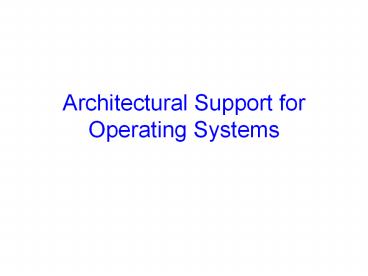Architectural%20Support%20for%20Operating%20Systems - PowerPoint PPT Presentation
Title:
Architectural%20Support%20for%20Operating%20Systems
Description:
Encoders convert lines to binary. Encoder. Encoder. Building a Keyboard Controller ... Encoder. Encoder. Latch. CLK. Building a Keyboard Controller. Circuit to ... – PowerPoint PPT presentation
Number of Views:34
Avg rating:3.0/5.0
Title: Architectural%20Support%20for%20Operating%20Systems
1
Architectural Support for Operating Systems
2
Announcements
- Most office hours are finalized
- Assignments up every Wednesday, due next week
- CS 415 section this Friday
- intro to the course and goals for the term
- details on the first part of the project
- overview of the project
- C for Java programmers
- syntax and similarities
- common pitfalls
- C software engineering
3
Next Two Lectures
- I/O subsystem and device drivers
- Interrupts and traps
- Protection, system calls and operating mode
- OS structure
- What happens when you boot a computer?
4
Computer System Architecture
Synchronizes memory access
5
I/O operations
- I/O devices and the CPU can execute concurrently.
- I/O is moving data between device controllers
buffer - CPU moves data between controllers buffer main
memory - Each device controller is in charge of certain
device type. - May be more than one device per controller
- SCSI can manage up to 7 devices
- Each device controller has local buffer, special
registers - A device driver for every device controller
- Knows details of the controller
- Presents a uniform interface to the rest of OS
6
Accessing I/O Devices
- Memory Mapped I/O
- I/O devices appear as regular memory to CPU
- Regular loads/stores used for accessing device
- This is more commonly used
- Programmed I/O
- Also called I/O mapped I/O
- CPU has separate bus for I/O devices
- Special instructions are required
- Which is better?
7
Building a Keyboard Controller
Mesh detects which key is pressed
8
Building a Keyboard Controller
Encoder
Encoder
Encoders convert lines to binary
9
Building a Keyboard Controller
CLK
Latch
Encoder
Encoder
Latch stores encoding of pressed key
10
Building a Keyboard Controller
CPU
CLK
Latch
Encoder
Data
Encoder
Clock
R/W
Circuit to read Latch data
Address
11
Building a Keyboard Controller
CPU
CLK
Latch
Encoder
Data
Buffer
Encoder
Clock
R/W
A simple functional keyboard!
DEMUX
Address
What is the problem?
12
Interrupts
- Mechanism required for device to interrupt the
CPU - Alternatively, CPU could poll. But this is
inefficient - Implementing interrupts
- A line to interrupt CPU
- Set of lines to specify priority
CPU
R/W
Data
Addr
Clock
Memory
Interrupt
Interrupt Priority
Device
13
Handling Multiple Devices
- Interrupt controller
- OR all interrupt lines
- Highest priority passed to CPU
- Can remap priority levels
CPU
Priority Selector
14
How does I/O work?
- Device driver loads controller registers
appropriately - Controller examines registers, executes I/O
- Controller signals I/O completion to device
driver - Using interrupts
- High overhead for moving bulk data (i.e. disk
I/O)
15
Direct Memory Access (DMA)
- Transfer data directly between device and memory
- No CPU intervention
- Device controller transfers blocks of data
- Interrupts when block transfer completed
- As compared to when byte is completed
- Very useful for high-speed I/O devices
16
Example I/O
Memory Instructions and Data
Instruction execution cycle
Thread of execution
cache
Data movement
CPU (N)
I/O Request
Interrupt
DMA
Data
Keyboard Device Driver and Keyboard Controller
Disk Device Driver and Disk Controller
Perform I/O
Read Data
17
Interrupts
- Notification from interface that device needs
servicing - Hardware sends trigger on bus
- Software uses a system call
- Steps followed on receiving an interrupt
- Stop kernel execution
- Save machine context at interrupted instruction
- Commonly, incoming interrupts are disabled
- Transfer execution to Interrupt Service Routine
(ISR) - Mapping done using the Interrupt Vector (faster)
- After ISR, restore kernel state and resume
execution - Most operating systems are interrupt-driven
18
Interrupt Timeline
19
Traps and Exceptions
- Software generated interrupt
- Exception user program acts silly
- Caused by an error (div by 0, or memory access
violation) - Just a performance optimization
- Trap user program requires OS service
- Caused by system calls
- Handled similar to hardware interrupts
- Stops executing the process
- Calls handler subroutine
- Restores state after servicing the trap































